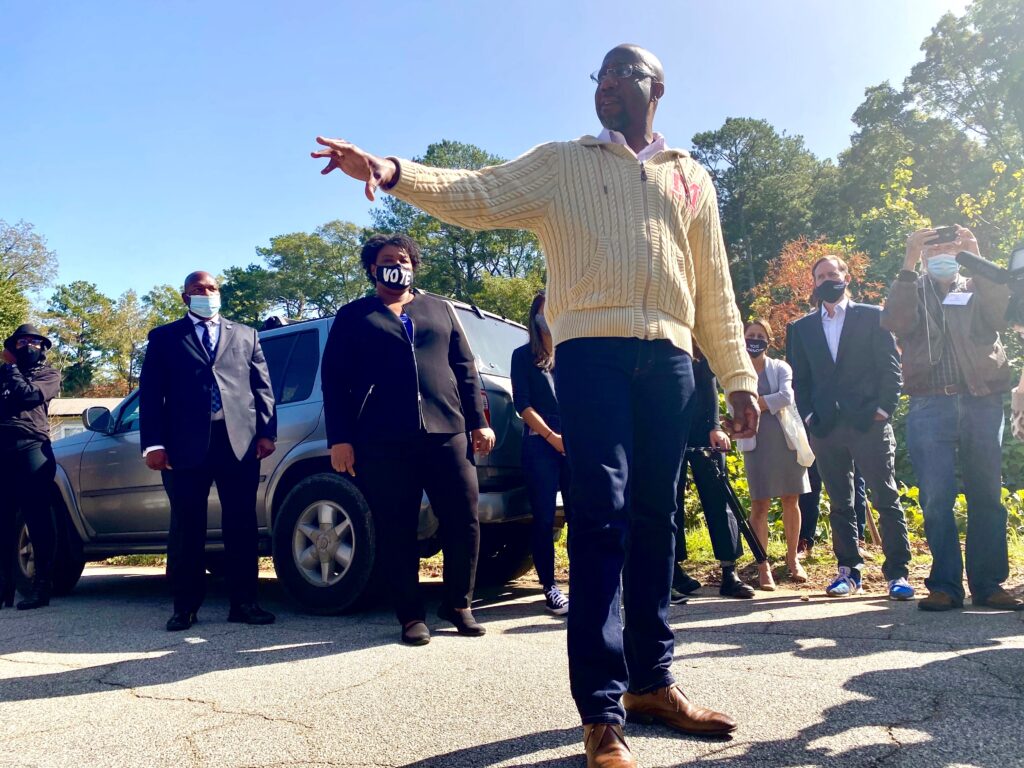
ATLANTA – The 2022 election cycle has come early.
National Republican groups are already targeting Georgia Democratic U.S. Sen. Raphael Warnock’s seat, less than two months after he took office following a historic win in January.
On Thursday, the National Republican Senatorial Committee (NRSC) — a premier fundraising arm backed by Senate Minority Leader Mitch McConnell — launched an ad campaign condemning Warnock’s support for the $1.9 trillion COVID-19 relief plan Congress passed this week.
Warnock, who is Georgia’s first Black U.S. senator, declined to respond to the GOP-led ad on Thursday. He has framed the latest aid package as a boon for Georgians across the state who have struggled for a year to cope with the tough economic and social troubles wrought by the COVID-19 pandemic.
“Help is on the way,” Warnock said on Twitter Thursday shortly after President Joe Biden signed the relief package. “I’ll say it again: ‘Thank God for Georgia.’ ”
Warnock also noted the federal package includes aid for Black farmers in Georgia, following up on a pledge he made to minority agriculture workers during his 2020 campaign for Senate.
The ad marks a gearing-up for Republican operatives aiming to seize back the Senate seat held by Warnock, who must seek reelection in 2022 to a full six-year term.
Warnock ousted Republican former Sen. Kelly Loeffler in January to serve out the remaining two years of retired Sen. Johnny Isakson’s six-year term. Isakson stepped down at the end of 2019 as he battled cancer and Parkinson’s disease.
Electoral wins on Jan. 5, 2020 by Warnock and his Democratic co-campaigner, Sen. Jon Ossoff, flipped both of Georgia’s Senate seats to the Democrats for the first time in nearly two decades.
Their upset wins also handed Democrats control of both chambers in Congress and the White House, paving the way for another round of COVID-19 relief pushed by the Biden administration to gain final passage.
Biden, a Democrat who defeated former Republican President Donald Trump by 11,779 votes in Georgia during the 2020 general election, is scheduled to visit Atlanta next Friday (March 19) for a so-called “Help Is Here” tour to promote the newly enacted COVID-19 relief package he signed shortly after it passed in the U.S. House of Representatives.
“Before I took office, I promised you that help was on the way,” Biden said on Twitter after the signing. “Today, I signed the American Rescue Plan into law, and can officially say: help is here.”
Republican lawmakers say the bill is bloated with a Democratic wish-list of financial relief benefiting undocumented persons, an abortion-rights agenda and aid to state governments run by Democratic governors.
“The people of Georgia did not expect the Democrats to respond to COVID by shipping billions of dollars to illegal immigrants, violent criminals and [New York] Governor [Andrew] Cuomo,” said the NRSC’s chairman, GOP Sen. Rick Scott of Florida. “Sadly, that’s exactly what Senator Warnock did.”
Democratic backers of the plan point out $300 billion will be sent directly to city and county governments, including public schools, marking a new payment round that skirts state oversight, unlike previous packages passed since March of 2020.
They highlight Georgia’s share of the new relief funds will hand the state more than $8 billion in COVID-19 aid, of which a large chunk would go straight to struggling city and county governments and give them more flexibility to shore up their pandemic-struck budgets.
“With the final passage of the American Rescue Plan in the House of Representatives today, Georgians are one step closer to getting the help they need to overcome the unprecedented public health and economic crises we face,” said Scott Hogan, executive director of the Democratic Party of Georgia.
“Georgia’s Democratic congressional delegation has been at the forefront of the fight to deliver big, bold relief to Americans, and with this bill’s passage, Democrats are fulfilling the promises made to Georgians to send direct payments, aid small businesses, ramp up vaccinations, and help schools reopen.”
The national criticism of Warnock’s vote in favor of the COVID-19 relief comes as Georgia’s top Republican leadership also slammed the aid plan’s details, even as they eye bids to shore up state political power in 2022.
Gov. Brian Kemp, who is seeking re-election in 2022, has called Georgia’s share of the latest relief round too paltry compared to the money pots for New York and California.
House Speaker David Ralston, R-Blue Ridge, has also savaged the relief package, on grounds that it would restrict state and local governments from cutting taxes and backfilling funding gaps with federal dollars.
Meanwhile, the field is wide open in 2022 for Georgia Republican candidates to challenge Warnock, the senior pastor of Atlanta’s Ebenezer Baptist Church.
Already, his opponent in the last election, Loeffler, has announced plans to run a grassroots group meant to motivate conservative Georgians, akin to successful Democratic mobilization efforts overseen by former gubernatorial candidate Stacey Abrams, who will likely wage a second campaign fight for governor against Kemp in 2022.
Former Sen. David Perdue, who lost to Ossoff in the Jan. 5 runoff, toyed with the idea of running for his old seat but declared last month he would not do so.
The federal “American Rescue Plan Act of 2021” gained final passage in Congress on Wednesday by a vote of 220-211, with all but one Democrat supporting it and all of the Republicans voting “no.”
The relief plan includes $1,400 economic stimulus checks for Americans earning up to $75,000 a year and couples earning up to $150,000 annually, an extension of $300-per-week in unemployment benefits, aid to state and local governments, funds to help schools reopen safely and an expanded federal child tax credit.
It also provides new funding for small businesses through the Paycheck Protection Program and additional funding to administer COVID-19 vaccines and expand testing and contact tracing.
Georgia’s six U.S. House Democrats voted in favor of the legislation. The state’s eight House Republicans opposed it.
